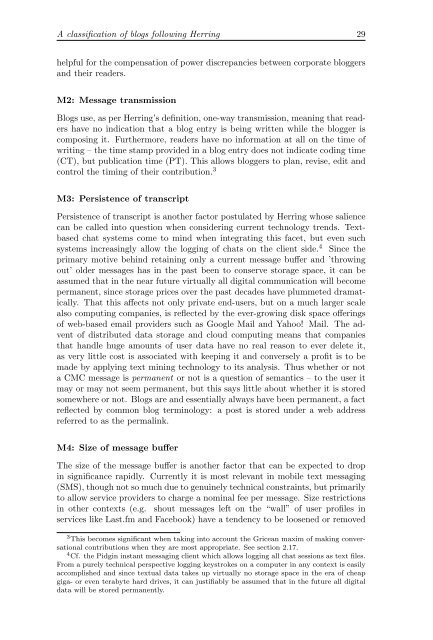The corporate blog as an emerging genre of computer ... - Oapen
The corporate blog as an emerging genre of computer ... - Oapen
The corporate blog as an emerging genre of computer ... - Oapen
You also want an ePaper? Increase the reach of your titles
YUMPU automatically turns print PDFs into web optimized ePapers that Google loves.
A cl<strong>as</strong>sification <strong>of</strong> <strong>blog</strong>s following Herring 29<br />
helpful for the compensation <strong>of</strong> power discrep<strong>an</strong>cies between <strong>corporate</strong> <strong>blog</strong>gers<br />
<strong>an</strong>d their readers.<br />
M2: Message tr<strong>an</strong>smission<br />
Blogs use, <strong>as</strong> per Herring’s definition, one-way tr<strong>an</strong>smission, me<strong>an</strong>ing that readers<br />
have no indication that a <strong>blog</strong> entry is being written while the <strong>blog</strong>ger is<br />
composing it. Furthermore, readers have no information at all on the time <strong>of</strong><br />
writing – the time stamp provided in a <strong>blog</strong> entry does not indicate coding time<br />
(CT), but publication time (PT). This allows <strong>blog</strong>gers to pl<strong>an</strong>, revise, edit <strong>an</strong>d<br />
control the timing <strong>of</strong> their contribution. 3<br />
M3: Persistence <strong>of</strong> tr<strong>an</strong>script<br />
Persistence <strong>of</strong> tr<strong>an</strong>script is <strong>an</strong>other factor postulated by Herring whose salience<br />
c<strong>an</strong> be called into question when considering current technology trends. Textb<strong>as</strong>ed<br />
chat systems come to mind when integrating this facet, but even such<br />
systems incre<strong>as</strong>ingly allow the logging <strong>of</strong> chats on the client side. 4 Since the<br />
primary motive behind retaining only a current message buffer <strong>an</strong>d ’throwing<br />
out’ older messages h<strong>as</strong> in the p<strong>as</strong>t been to conserve storage space, it c<strong>an</strong> be<br />
<strong>as</strong>sumed that in the near future virtually all digital communication will become<br />
perm<strong>an</strong>ent, since storage prices over the p<strong>as</strong>t decades have plummeted dramatically.<br />
That this affects not only private end-users, but on a much larger scale<br />
also computing comp<strong>an</strong>ies, is reflected by the ever-growing disk space <strong>of</strong>ferings<br />
<strong>of</strong> web-b<strong>as</strong>ed email providers such <strong>as</strong> Google Mail <strong>an</strong>d Yahoo! Mail. <strong>The</strong> advent<br />
<strong>of</strong> distributed data storage <strong>an</strong>d cloud computing me<strong>an</strong>s that comp<strong>an</strong>ies<br />
that h<strong>an</strong>dle huge amounts <strong>of</strong> user data have no real re<strong>as</strong>on to ever delete it,<br />
<strong>as</strong> very little cost is <strong>as</strong>sociated with keeping it <strong>an</strong>d conversely a pr<strong>of</strong>it is to be<br />
made by applying text mining technology to its <strong>an</strong>alysis. Thus whether or not<br />
a CMC message is perm<strong>an</strong>ent or not is a question <strong>of</strong> sem<strong>an</strong>tics – to the user it<br />
may or may not seem perm<strong>an</strong>ent, but this says little about whether it is stored<br />
somewhere or not. Blogs are <strong>an</strong>d essentially always have been perm<strong>an</strong>ent, a fact<br />
reflected by common <strong>blog</strong> terminology: a post is stored under a web address<br />
referred to <strong>as</strong> the permalink.<br />
M4: Size <strong>of</strong> message buffer<br />
<strong>The</strong> size <strong>of</strong> the message buffer is <strong>an</strong>other factor that c<strong>an</strong> be expected to drop<br />
in signific<strong>an</strong>ce rapidly. Currently it is most relev<strong>an</strong>t in mobile text messaging<br />
(SMS), though not so much due to genuinely technical constraints, but primarily<br />
to allow service providers to charge a nominal fee per message. Size restrictions<br />
in other contexts (e.g. shout messages left on the “wall” <strong>of</strong> user pr<strong>of</strong>iles in<br />
services like L<strong>as</strong>t.fm <strong>an</strong>d Facebook) have a tendency to be loosened or removed<br />
3 This becomes signific<strong>an</strong>t when taking into account the Grice<strong>an</strong> maxim <strong>of</strong> making conversational<br />
contributions when they are most appropriate. See section 2.17.<br />
4 Cf. the Pidgin inst<strong>an</strong>t messaging client which allows logging all chat sessions <strong>as</strong> text files.<br />
From a purely technical perspective logging keystrokes on a <strong>computer</strong> in <strong>an</strong>y context is e<strong>as</strong>ily<br />
accomplished <strong>an</strong>d since textual data takes up virtually no storage space in the era <strong>of</strong> cheap<br />
giga- or even terabyte hard drives, it c<strong>an</strong> justifiably be <strong>as</strong>sumed that in the future all digital<br />
data will be stored perm<strong>an</strong>ently.


